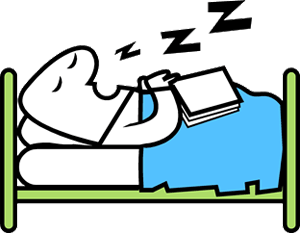 A recent Gallup poll revealed that 40% of Americans are not getting the recommended 7 minimum hours of sleep per night. Many of us are burning the candle at both ends juggling long hours at work with a gaggle of personal responsibilities. And when we’re not busy with the business of life, we’ve got all of those electronic devices competing for our attention.
A recent Gallup poll revealed that 40% of Americans are not getting the recommended 7 minimum hours of sleep per night. Many of us are burning the candle at both ends juggling long hours at work with a gaggle of personal responsibilities. And when we’re not busy with the business of life, we’ve got all of those electronic devices competing for our attention.
We don’t look or feel our best when we haven’t gotten enough sleep. According to sleep expert Dr. Michael Breus, loss of a mere 90 minutes of sleep could reduce our alertness by a third the following day. We might be able to power through our fatigue, perhaps with a certain amount of pride that we’re able to keep things rolling even when we aren’t operating at peak efficiency. But whether we like it or not, we really do need our sleep.
We need sleep to regenerate physically. During sleep, the pituitary gland releases growth hormone to support nightly repair and rebuilding of our organs, muscles, and bones. Our heart rate and blood pressure lower, giving our entire cardiovascular system a much-needed rest. Sleep also allows for expansion in the space between our brain cells to expose and eliminate toxins. Should this debris transform into plaque, we increase our risk of stroke and dementia.
We need sleep to regenerate cognitively. Our brains use restorative sleep to process and consolidate our daily dose of information and experience. Sleep deprivation disrupts memory formation, diminishes our capacity for focused attention, and draws down our reserves of will power. Poor recall, a wandering mind, and difficulty sticking to the task at hand all contribute to a substantive decline in productivity. It also increases the odds that we’ll make errors, have accidents, and cause bodily injury to ourselves or others.
We need sleep to regenerate emotionally. No matter how much we enjoy our work, our friends and families, and our communities, we need a break to reset our emotional clocks and start anew. REM sleep provides the opportunity to process and consolidate our emotional experiences. Sleep deprivation and chronic fatigue dampen our enjoyment of life and is a risk factor for anxiety and depression.
We need sleep promote longevity. Folks with good sleep hygiene tend to have long telomeres. Telomeres are the protective “tips” on our DNA strands that hold them together during cellular division. Poor sleep quality threatens these life-sustaining biological structures. Once they’re unsustainably short, our cells can no longer regenerate.
A pharmacological approach to sleeping is not a good idea. It doesn’t deliver the quality of sleep that Mother Nature intended and carries the risk of physical or psychological dependence. It’s far preferable to pursue good sleep habits that help the body leverage its built-in mechanisms.
Here are 7 tips to promote good sleep:
- Make your bedroom a sanctuary for sleep. Get a comfortable bed with high quality sheets, blankets, and pillows. Ban TVs, phones, computers, and other electronic devices from the room. Use dim lighting.
- Maintain regular sleep patterns. Go to bed and rise at roughly the same time daily.
- Support your body’s circadian rhythm by getting lots of bright light during the day and avoiding artificial light in the hours before bedtime. (Note: Amber-tinted glasses can be used to block the blue spectrum light that disrupts production of sleep-inducing melatonin.)
- Eat on a regular schedule to keep your hunger hormones in check. The last meal of the day should tide you over until morning without making you feel full at bedtime.
- Don’t drink alcohol at night. While alcohol is a sedative upon consumption, it has a stimulatory effect as it breaks down in the bloodstream. It releases adrenaline and disrupts serotonin production.
- Design a relaxing bedtime routine to manage the transition from wakefulness to a slow descent into sleep.
- Use a yellow- or red-tinted night light to avoid sleep-disrupting blasts of blue light during nocturnal pit stops.
Sweet dreams!
Sources:
- Sandra Aamodt, PhD and Sam Wang, PhD – Welcome to Your Brain: Why You Lose Your Car Keys but Never Forget How to Drive and Other Puzzles of Everyday Life, ©2008
- Elizabeth Blackburn, PhD and Elissa Epel, PhD – The Telomere Effect: A Revolutionary Approach to Living Younger, Healthier, Longer, ©2017
- Sara Gottfried, MD – Younger: A Breakthrough Program to Reset Your Genes, Reverse Aging, and Turn Back the Clock 10 Years, ©2017
- David Perlmutter, MD – Grain Brain: The Surprising Truth About Wheat, Carbs, and Sugar – Your Brian’s Silent Killers, ©2013